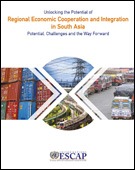Services and Global Value Chains: The Asia-Pacific Reality, Studies in Trade, Investment and Innovation 89This book reviews issues concerning the roles of services in global value chains. It presents a framework for assessing links among different services and between services and the manufacturing sector. The book explains the contribution of services to global value chains in the Asia-Pacific region and to the world and also draws lessons with which countries could understand the importance of services and participation in global value chains to achieving sustainable development. Author: Witada Anukoonwattaka, Mia Mikic, Yuhua Zhang Year: 2017 Download Tags: ASEAN, Asia-Pacific, Energy, Global Value Chains, India, Nepal, Regional Cooperation, Sri Lanka, Sustainable Development, Sustainable Development Goals, Trade Facilitation, UNESCAP ESCAP Newsletter - June 2017The ESCAP Newsletter is a monthly recap of the key events, publications and other activities of the United Nations Economic and Social Commission for Asia and the Pacific (UNESCAP). It highlights the key issues that the UNESCAP works on and how the organization works to support member states in reaching the objectives of the Sustainable Development Goals (SDGs). This issue highlights the 73rd Commission Session of Asia-Pacific leaders on "Regional Cooperation for Sustainable Energy," which culminated with the adoption of resolutions advancing transport connectivity and sustainable energy development. Author: United Nations Economic and Social Commission for Asia and the Pacific Year: 2017 Download Tags: Energy, Regional Cooperation, UNESCAP, Sustainable Development, Sustainable Development Goals  Unlocking the Potential of Regional Economic Cooperation and Integration in South AsiaAt a modest 6% of total trade, intraregional trade in South Asia stands at less than one third of its full potential. Trade barriers and inadequate infrastructure have cost South Asia over US $54 billion per year in lost export opportunities. With 309 million people living on less than $1.90 a day—the largest concentration of poverty in the world—South Asia should urgently pursue broad-based regional economic cooperation that could enable effective responses to the subregion’s developmental challenges. This report examines the state of economic integration in South Asia and identifies potential areas for further strengthening subregional linkages. It provides recommendations on policy actions to increase market integration, improve connectivity, boost investment in infrastructure development, and tackle shared vulnerabilities and risks. It calls for the consolidation and upgrading of existing trade and investment cooperation initiatives into a South Asia Comprehensive Economic Partnership. Author: United Nations Economic and Social Commission for Asia and the Pacific Year: 2017 Download Tags: BIMSTEC, Investment, Regional Cooperation, SAARC, South Asia, Sustainability, Sustainable Development, Trade, UNESCAP, Bangladesh, Bhutan, India, Maldives, Myanmar, Nepal, Sri Lanka Trade and the Post-2015 Development AgendaTrade and services are instrumental in achieving the Sustainable Development Goals. While openness to trade improves economic growth prospects, sound trade policy and efforts to reduce the costs of trade are necessary to bridge the link between trade growth and poverty reduction. For low income countries, there is still great scope to leverage trade for development, and pursue better access to a products and services to improve welfare, which can significantly contribute to economic development. In keeping with the post-2015 development agenda, this paper recommends sustained efforts by governments to reduce trade costs, support policy reforms to improve services trade, and focus on trade cost reduction and services trade facilitation. Author: Bernard Hoekman Year: 2017 Download Tags: Trade Facilitation, Services, Sustainable Development, Poverty Reduction, ADB Trade Facilitation and Global Value Chains: Opportunities for Sustainable DevelopmentThis paper analyzes the relationship between global value chains (GVCs) and trade facilitation, and its contribution to sustainable development outcomes on low-income and least developed countries (LICs and LDCs). A key insight of the paper concludes that it is not fundamentally GVCs that drive the sustainable development implications of improved trade facilitation, but the resulting extension and intensification of economic activity. It underlines the importance of putting in place domestic regulatory infrastructure that considers the appropriate economic, social, and environmental dimensions to ensure that GVCs remain consistent with the global commitment to sustainable development, while expanding economic opportunities of LICs and LDCs. Author: Ben Shepherd Year: 2016 Download Tags: Trade Facilitation, Trade, Global Value Chains, Sustainability, Sustainable Development, Least Developed Countries, LDC |




